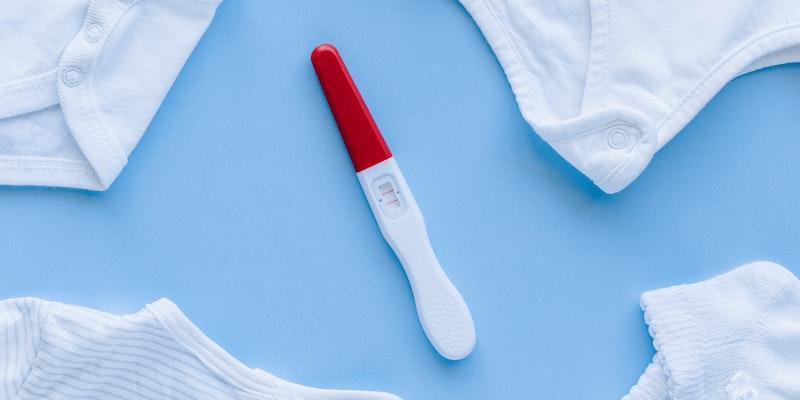Reading Early Pregnancy Tests: Trustworthy or Tricky?
Dec 05, 2023 By Nancy Miller
Being pregnant is complicated, so early detection is beneficial. Technology and medical devices make pregnancy tests more sensitive to detecting even the lowest hCG (human chorionic gonadotropin). But an early positive—does it always confirm pregnancy?
hCG and Pregnancy Detection
Human chorionic gonadotropin (hCG) is the 'pregnancy hormone.' The uterus produces it immediately after a fertilized egg attaches. During early pregnancy, the hormone helps the corpus luteum in the ovary produce progesterone.
Pregnancy tests detect the presence of hCG in a woman's system. The principle remains the same whether taken at home or a doctor's clinic. However, what varies is the sensitivity of these tests.
The onset of pregnancy triggers the production of hCG. Therefore, its detection indicates the early signs of pregnancy. For those keenly observing their bodies for the first signs of pregnancy, hCG levels become crucial. The hormone's presence signals the earliest signs of pregnancy and significantly ensures the pregnancy progresses healthily.
Variability in hCG Levels
hCG levels can vary significantly among women. Some might produce a high amount shortly after the fertilized egg implants, while others might take a few more days. Factors like the time taken for implantation, the health of the pregnancy, and individual hormonal fluctuations can influence these levels.
Early Pregnancy Tests

Traditional pregnancy tests typically detect hCG levels ranging from 20 to 50 mIU/mL. However, the newer generation of early pregnancy tests can see levels as low as 10 to 15 mIU/mL. This heightened sensitivity allows them to identify pregnancies several days before traditional tests can potentially occur.
As women search for the earliest signs of pregnancy, the sensitivity of these tests becomes paramount. The capability to detect minimal hCG levels promises results before the menstrual cycle is missed.
Time of Embryo Implantation
The process of embryo implantation is not fixed. Depending on various factors, including the woman's cycle and the embryo's health, implantation might take 6 to 12 days post-fertilization. This variability can affect the time hCG starts being produced, influencing when an early pregnancy test might show positive results.
Ensuring Accuracy
While early pregnancy tests promise to detect the early signs of pregnancy, it's essential to ensure Accuracy. Testing too early, even before the embryo can implant, might lead to false-negative results. On the other hand, certain conditions or medications can occasionally cause false positives.
The Reality of Early Positive Results
Chemical Pregnancies
A positive result from an early pregnancy test could sometimes detect a chemical pregnancy. This term refers to an early miscarriage that often occurs even before many women realize they're pregnant. The higher sensitivity of early pregnancy tests can detect such pregnancies that might unfortunately not continue, leading to the challenge of managing emotional expectations.
Variabilities in Embryo Growth Rate
Not every embryo develops at the same pace. Individual factors, genetic and environmental, can influence the growth rate. As Dr. Taylor emphasized, there can be a variation of about a day or more in the implantation process based on the growth rate. This means the time taken for a test to show positive results can differ.
Understanding Test Limitations
While these tests promise to identify the first signs of pregnancy, it's essential to recognize their limitations. External factors such as the time of day the test is taken, the concentration of urine, and even the test brand can impact results.
Pros and Cons of Early Testing
The various pros and cons possibilities of early testing for pregnancy are given below:
Advantages of Early Detection
- Immediate Health and Lifestyle Adjustments: Recognizing the early signs of pregnancy enables individuals to quickly adapt health and lifestyle choices to ensure optimal fetal health. Dietary adjustments, prenatal vitamin intake, and cutting out potential harmful behaviors like smoking or excessive caffeine consumption can make a significant difference in those early stages.
- Mental Preparedness: Detecting the first signs of pregnancy earlier gives couples more time to mentally prepare for the changes, from preparing for prenatal appointments to discussing future parenting roles.
- Personal Connection: For many, knowing about a pregnancy sooner establishes an earlier emotional bond with the unborn child, making the experience even more profound.
Disadvantages of Early Testing
Handling Potential False Results: As sophisticated as tests may be, they must be more foolproof. False positives and negatives can occur, leading to unnecessary stress or unpreparedness.
- Emotional Implications: Detecting a pregnancy at its earliest signs, only to experience a loss soon after, can be emotionally challenging. Early detection might expose couples to the harsh reality of chemical pregnancies, which may have gone unnoticed.
- Potential for Obsessive Behavior: The availability of early detection tests might prompt some to test compulsively, seeking validation for the earliest signs of pregnancy. This behavior can lead to undue stress and anxiety.
Expert Recommendations

There's an undeniable excitement around the possibility of detecting a pregnancy at its inception. The notion of grasping the early signs of pregnancy, even before they become overtly visible or noticeable, is attractive to many. The suspense of waiting to confirm a potential life-altering event can be overwhelming.
The market is flooded with advanced pregnancy tests promising to reveal these earliest signs of pregnancy before any other product. They target the emotional anticipation tied to conceiving, offering the hope of ending the anxious wait.
Pregnancy Journey Post-Early Detection
Upon detecting the earliest signs of pregnancy, it's prudent to embark on the ensuing journey with informed steps:
- Consultation: Before making any decisions or changes based on an early positive result, it's advisable to consult with a healthcare professional. They can provide comprehensive insights, validate the test results, and offer guidance on the next steps.
- Lifestyle Choices: Recognizing early signs of pregnancy allows one to make proactive health choices. This might include a balanced diet, regular prenatal checkups, and avoiding substances or activities detrimental to pregnancy.
- Emotional Preparedness: Knowing about pregnancy's emotional roller-coaster requires support from family, friends, or professional counselors.







